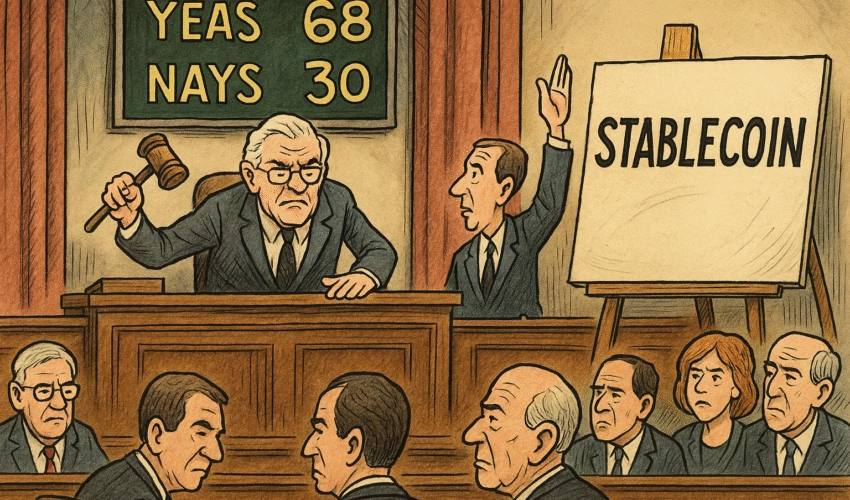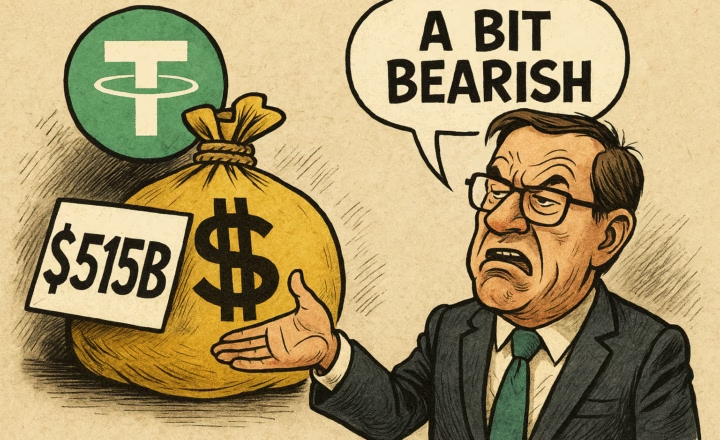Legislation Moves Closer to Law Despite Concerns Over Trump’s Ties to Crypto Industry
The U.S. Senate has passed the Guiding and Establishing National Innovation for U.S. Stablecoins (GENIUS) Act, marking a significant step toward the establishment of a federal regulatory framework for payment stablecoins.
In a 68–30 vote on Tuesday, the Senate approved an amended version of the bill, originally introduced by Senator Bill Hagerty of Tennessee in early May. The legislation now heads to the House of Representatives, where it may face additional scrutiny and proposed amendments — particularly concerning the bill’s implications for U.S. President Donald Trump’s ties to the crypto industry.
“With this bill, the United States is one step closer to becoming the global leader in crypto,” Hagerty said during floor remarks.
“Businesses of all sizes, and Americans across the country, will be able to settle payments nearly instantaneously, rather than waiting days or weeks.”
Trump-Linked Crypto Platform Sparks Debate
The GENIUS Act initially failed to clear a cloture vote in May amid opposition from Democratic senators, many of whom raised concerns over President Trump’s connections to the crypto space.
The controversy centers on World Liberty Financial, a crypto platform tied to the Trump family, which issued its own USD1 stablecoin in March. Critics argued that stablecoin regulation could personally benefit the president and his associates unless clear conflict-of-interest provisions were added to the bill.
Despite this, the version of the bill passed on Tuesday did not include any amendments addressing these concerns.
What the GENIUS Act Proposes
The GENIUS Act aims to:
-
Establish federal licensing standards for payment stablecoin issuers
-
Define acceptable reserve and redemption requirements
-
Authorize federal agencies to oversee compliance and consumer protection
-
Provide a pathway for both banks and nonbanks to issue stablecoins under regulatory supervision
The bill is widely seen as a response to growing institutional interest in stablecoin use for cross-border payments, DeFi applications, and digital commerce.
“Recent reporting projects that stablecoins could grow into a $3.7 trillion market by the end of the decade,” said Treasury Secretary Scott Bessent in a post on X.
“That scenario becomes more likely with passage of the GENIUS Act.”
Tech Giants Reportedly Eyeing Stablecoin Entry
Reports have emerged that several major tech and fintech firms — including Apple, Google, X (formerly Twitter), and Airbnb — have been exploring potential stablecoin integrations pending regulatory clarity.
Two U.S. senators also raised questions about whether Meta (formerly Facebook) could revive its shelved stablecoin ambitions if the GENIUS Act becomes law.
The prospect of a regulated U.S. stablecoin environment has fueled speculation about a wave of corporate-issued tokens, potentially changing the landscape of digital payments and programmable finance.
House Companion Bill and Market Structure Legislation
In parallel to the GENIUS Act, the House of Representatives is preparing to vote on the CLARITY Act, which would:
-
Define the market structure for digital assets
-
Clarify the roles of the SEC and Commodity Futures Trading Commission (CFTC)
-
Provide regulatory certainty for token issuance, custody, and secondary trading
Versions of the CLARITY Act passed through the House Agriculture Committee and the House Financial Services Committee last week and are now awaiting a full floor vote.
Similar to the GENIUS Act, the CLARITY Act has faced pushback from Democrats over concerns that it could legitimize crypto businesses linked to the Trump family without sufficient oversight.
Critics Say Bills Overlook Ethical Red Flags
Consumer advocacy group Public Citizen issued a statement criticizing lawmakers for advancing the GENIUS and CLARITY Acts without addressing conflicts of interest.
“In advancing these bills, lawmakers forfeited their opportunity to confront Trump’s crypto grift — the largest, most flagrant corruption in presidential history,” said Bartlett Naylor, financial policy advocate at Public Citizen.
“These bills serve to legitimize what amounts to a massive scam with the American flag.”
Despite this criticism, the bills continue to enjoy bipartisan support, particularly among lawmakers pushing for U.S. leadership in blockchain innovation.
What Comes Next
The GENIUS Act will now move to the House of Representatives, where it could face further debate and possible amendments before proceeding to a final vote. If passed, the bill would then be sent to President Trump’s desk for signing.
If both the GENIUS and CLARITY Acts become law, they could lay the foundation for a comprehensive digital asset framework in the United States — bringing long-awaited regulatory clarity for stablecoins, crypto exchanges, and digital asset custodians.
Conclusion
The Senate’s passage of the GENIUS Act represents a watershed moment for U.S. crypto regulation, potentially opening the door to widespread stablecoin adoption by both financial institutions and technology companies.
However, the bill’s progress remains politically charged, as critics question its ethical implications and ties to Trump-linked crypto entities. As the legislation heads to the House, the coming weeks may prove decisive in shaping the future of U.S. digital currency policy.












